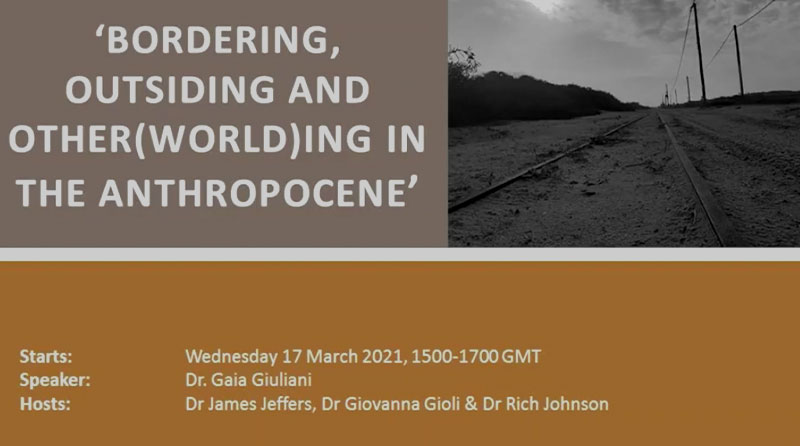Bordering, Outsiding and Other(world)ing
Event
Bordering, Outsiding and Other(world)ing in the Anthropocene
Wednesday 17 March, 20213:00 PM – 5:00 PM
Online
Part of the Hazard, Risk and Disaster (HRD) Research Lecture Series 2020-21.
The Western environmental, social and political history of humans and the Earth is the result of a segmentation along cartographic lines that throughout the Anthropocene have been drawn, to paraphrase De Certeau (1975), for the purpose of absorbing and eliminating biological and cultural diversity and hybridity through geography and history – combined with the subordination of all to the logic of profit. In Western Modernity this allowed the State to build and defend its sovereignty. From this perspective, bordering, Outsiding and Other(world)ing end up being biopolitical dispositifs to separate people and ward off some while linking them to monstrosity, as well as distancing their geographies and projecting them onto otherworldliness. Historical examples of Othering/Other(world)ing can be seen in the relations between Southern Europe and Africa/the Middle East (Chambers 2008), Australia and Southern Asia (Perera 2009), North America and Latin America (Vila 2003), where practices of alien-ing have implied cultural separateness and racial incompatibility, although cultural and biological mixing have always been the result of more or less violent encounters, exchanges and conquests.
In all these cases, languages, histories and populations have since been considered extraterritorial, foreign, alien to Western experience when they are, in fact, connected. The biopolitics of Bordering, Outsiding and Other(world)ing has enforced not only a human ontology of distance and opposition through camps, colonies, walls, borders and carceral archipelagos but also a geographical ontology of difference. Today that difference is constantly re-enacted in discourses on climate change, environmental catastrophe, terrorism and poverty in the Global South, as if the ‘place of civilisation’ bore no connection to the space in which the crisis occurs, nor any responsibility.
In my work I thus distinguish between “places of disaster” from “places for disaster”, meaning the first places where disasters and catastrophes are deemed as not systemic (the West) and the second those places “Out There”, where the ‘we’ believes disaster to be endemic and essentially linked to the backwardness, poverty and lack of knowledge and skills of the “non-civilised”. The second are also the places available for extreme extractivism and exploitation with apparently no consequences for the ‘we’ and its environment. But the black and brown bodies of today’s ‘migrant aliens’, as well as the COVID-19 pandemic are telling the ‘we’ a different story about the Anthropocene and the apocalypse – a story that is often acknowledged or rejected, denied and violently silenced.
A video of the talk is available below.
About the speaker
Dr. Gaia Giuliani is a political philosopher who works as a permanent researcher at the Center for Social Studies (CES), University of Coimbra (Portugal), associate professor in Political philosophy (ASN 2017, Italy), PI of the FCT project “(De)Othering. Deconstructing Risk and Otherness in Portuguese and European mediascapes” (POCI-01-0145-FEDER-029997) (2018-2021), and founding member of the Interdisciplinary Research Group on Race and Racisms (Italy). She is also a member of the Cost Action 19129 - Decolonising Development: Research, Teaching and Practice (2020-2024). Her research interests focus on visual constructions of race and whiteness from an intersectional viewpoint.
Her methodology crosses critical race and whiteness studies, postcolonial, cultural and gender studies. In 2013 she published the co-written monographic book Bianco e nero. Storia dell'identità razziale degli italiani with Dr. Cristina Lombardi-Diop (Le Monnier 2013) that in that year won the First prize in the 20th-21st century category by the American Association for Italian Studies. Some of her recent books are: Race, Nation, and Gender in Modern Italy (Palgrave Macmillan 2018) and Monsters, Catastrophes and the Anthropocene. A Postcolonial Critique (Routledge 2020).
